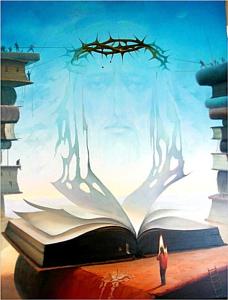
What if the universe is weirder and more complex than we could ever imagine? What if each of us is living not just one life—but many—and the reality you’re now experiencing is just one of many you are participating in?
That’s the general concept behind the novel The Midnight Library by Matt Haig. Early in the book, our protagonist Nora decides to end her life. But death is not the end of her story. Nora crosses over to find she is in a massive library with rows of books as far as the eye can see. She is greeted by a Mrs. Elm, a librarian she was friendly with in high school.
Mrs. Elm informs Nora that the endless number of books in the library represent the infinite possibilities of her life. Each book on the shelves holds a different version of her life, a reality where she made a different choice at a pivotal moment. The library allows Nora to explore the “what ifs” of her life, the regrets about paths not taken. And in a search for happiness, Nora gets to try these lives on for size, to see if they were a better fit than the one she chose to depart.
It sounds like science fiction—but it’s based on science fact.
In the book, a character named Hugo mentions the real-world quantum physics research of Erwin Schrödinger. The theoretical physicist is best known for a thought experiment called “Schrödinger’s cat.” It’s pretty complex, (see the details here), but it seems to prove that in every moment of life—including your life and mine—with each decision you make, you enter a new universe. It has been coined the “many-worlds” theory and Hugo explains it like this:
Every life contains many millions of decisions. Some big, some small. But every time one decision is taken over another, the outcomes differ. An irreversible variation occurs, which in turn leads to further variations.
The result, according to those who study quantum physics, is that every quantum measurement causes the universe to split into multiple parallel universes. Each representing a different possible outcome. The result: we are living multiple parallel timelines in an infinite number of divergent parallel universes—with each alternative possibility happening simultaneously.
Of course, you are only aware of the universe you are living in right now. But somewhere in another parallel world, there is another you. A you that maybe decided to change your major in college, pursue a different career path, marry another person, or pack up and move to Key West. Every decision you make, whether it’s major or minor, creates a new universe.
Welcome to the Multiverse.
In the book The Simulated Multiverse, MIT computer scientist Rizwan Virk refers to the world with multiple parallel timelines as the “multiverse.” He restates the fact (and it’s worth repeating) that in the “many worlds” interpretation, “literally different physical universes are created whenever a quantum choice (or decision) is made.” That means new “physical universes are being created in every instant.”
Virk goes so far as to compare life to a video game. He speculates we may be living in a computer simulation with an almost infinite array of possible outcomes. We choose a particular path in life—but there are many other roads in life that we not only could take, but have taken. Even if, in this world, we are unaware of it. Virk calls it “the garden of forking paths” and believes we are on our own particular path for reasons beyond our comprehension.
Is the “Mandela Effect” proof of the multiverse?
Virk devotes a chapter in his book to the Mandela Effect. It’s defined as a phenomenon where a large group of people misremember a specific fact, event, or detail, and share the same false memory. Its name comes from the widespread false belief that Nelson Mandela died in prison in the 1980s, when in reality, he was released from jail in 1990 and died in 2013.
The Mandela Effect, if true, could be proof of parallel timelines and realities. Due to a “glitch in the matrix,” one large segment of the population remembers a detail or event in a way that doesn’t jibe with reality as we know it today. While I personally don’t recall Mandela dying in prison, these examples of the Mandela Effect are more relatable:
- “Luke, I am your father.” Many people misremember Darth Vader saying “Luke, I am your father” in Star Wars: Episode V The Empire Strikes Back. The actual line is “No, I am your father.”
- “Mirror, mirror on the wall.”: In Snow White and the Seven Dwarfs, the Evil Queen actually says, “Magic mirror on the wall,” not “Mirror, mirror on the wall.”
- Monopoly Man’s monocle. Many people remember the Monopoly Man wearing a monocle, but he never has.
Should the concept of parallel timelines cause us concern?
Of course, all this talk of parallel timelines may have you wondering: Am I on the right path? Am I living in the optimal timeline for me? Or in another universe, just out of view, and I living a more fulfilling and happier life, one without regrets?
In The Midnight Library author Haig shows us that there’s no such thing as a perfect life. As Nora moves from one life to another along parallel timelines, she finds out that each life, no matter how golden it may seem at first glance, has its share of challenges and pitfalls. She concludes that:
There is no life where you can live in a state of sheer happiness forever. Sadness is intrinsically part of the fabric of happiness. You can’t have one without the other. Of course, they come in different degrees and quantities.
We can only hope that we have followed the path best suited to our purpose in this life. So that when we look back on our lives, the moments of inevitable sadness or regret are outnumbered by periods of happiness or contentment. Virk tries to reassure us that this is the case, writing:
If you are in this timeline, don’t worry about the other possible presents that may be existing, may have already existed, or may exist in the future. One way or another, you are most likely where you are supposed to be.

















